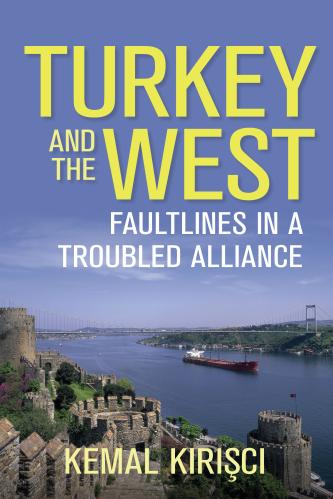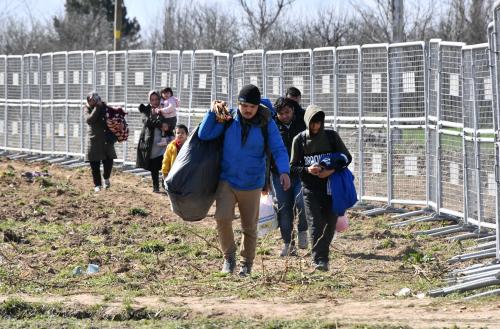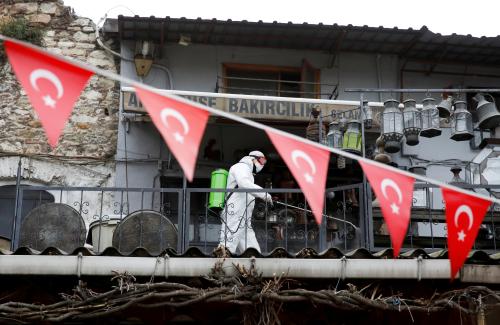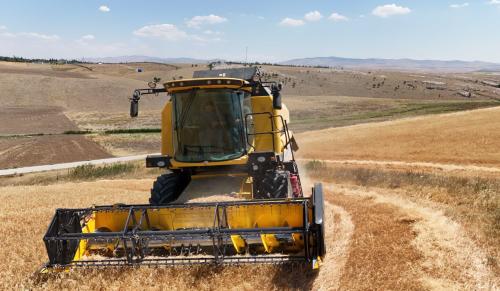Granting trade concessions to countries hosting large number of refugees would be a novel way to support those refugees’ independence and livelihoods, writes Kemal Kirişci. This piece was originally published by the International Trade Forum. It is part of a series on refugees in Turkey made possible by support from the Tent Partnership for Refugees. The views expressed are those of its author and do not represent the views of Tent, their officers, or employees.
The COVID-19 pandemic has further revealed the deep vulnerability of refugee populations around the world. The pandemic has exacerbated the precarity of refugees’ lives in terms of access to hygiene and health facilities, decent housing and livelihoods, creating a “double emergency” situation. This compels U.N. agencies and their partners to double down on mobilizing efforts to support emergency responses. However, as the U.N. High Commissioner for Refugees Filippo Grandi noted, securing the self-reliance of refugees and the resilience of their host communities remains important. Granting trade concessions to countries hosting large number of refugees would be a novel way to do this.
Overcoming a broken refugee protection system
The 2015-16 European migration crisis revealed the extent to which the traditional refugee-response system — finding durable solutions to forced displacement through local integration, resettlement and repatriation — is broken. This leads to an ever-growing number of refugees finding themselves in protracted situations with limited hope. With the total refugee population now at an all-time high of 25.9 million, nearly 85% hosted in developing countries, it is imperative for refugees to be productive members of society rather than a burden dependent on humanitarian largesse.
The Global Compact on Refugees, adopted in December 2018, provides proposals for improvements. It calls on the signatories to ‘promote economic opportunities, decent work, job creation and entrepreneurship programs for host community members and refugees’. A growing body of research shows that proper employment prospects and a welcoming business environment for refugees contribute to economic growth in host countries.
Limited success
Given the more than five million Syrian refugees dispersed across countries neighboring Syria, improving the self-reliance of refugees has increasingly acquired significance within the international community. This policy perspective became part of the Syria Regional Refugee and Resilience Plan for 2016-17, emphasizing the employability of refugees and supporting start-ups.
These programs have been especially visible in Turkey, which hosts close to four million, mostly Syrian, refugees under temporary protection, the world’s largest refugee population. While livelihood partners have offered numerous Syrians vocational training, Turkish language courses and career counseling, the number of formal jobs with work permits that Syrians have been able to access stood at less than 133,000 at the end of 2019. Instead, an estimated one million working-age Syrians are employed informally, usually under precarious conditions. Programs primarily focusing on supply-side interventions fall short of generating meaningful, formal employment opportunities. It would be more effective to focus their efforts on spurring demand for formal refugee labor.
Trade concessions
Trade liberalization is a key driver of economic growth and employment. It is not surprising that, as part of responsibility sharing among countries hosting large numbers of refugees, the Global Compact on Refugees suggests preferential trade arrangements. This policy tool, used in particular for goods and sectors with a high refugee participation, could create better and sustainable job opportunities for refugees. The resulting economic growth would also benefit host communities and serve to support social cohesion.
But these ideas need to be operationalized further. Currently, the EU-Jordan Compact is the only functioning arrangement matching trade concessions with refugee labor: the EU agreed to give Jordan facilitated access to its markets, particularly for textile products, in return for issuing work permits to Syrian refugees employed in Jordanian companies. The benefits are two-fold: refugees receive economic opportunities while Jordan’s industrial production base expands through exports. Even while falling short of its full potential, some experts regard the compact as a game-changer for demonstrating an effective response to protracted refugee situations.
The Turkish case offers another opportunity to employ trade concessions to benefit refugees. As COVID-19 damages Turkey’s economy and further exacerbates the situation of refugees working informally, extending trade concessions in return for the formal employment of refugees would incentivize more Turkish businesses to hire them. The modalities of this arrangement should be formulated in a manner that ensures local employment, critical to diffusing the belief of many Turkish nationals that refugees take jobs away from them.
One way to achieve this would be for the EU to grant trade concessions tying Turkish agricultural exports to the formal employment of Syrians. Turkey’s existing customs union with the EU has improved employment and economic growth but covers only industrial goods. Exports of fresh fruits, vegetables and processed agricultural products face taxes and regulatory restrictions. Worse still, Turkey’s agricultural sector suffers from a labor supply shortage as both GDP and employment shift towards non-agricultural sectors. However, trade concessions in the agricultural sector is a politically sensitive topic in the EU. Hence, monitoring and ensuring compliance as well as technical assistance for small businesses would need to accompany concessions, to meet the stringent EU food safety and sanitary standards.
Win-win for all
Cooperation between the EU and Turkey to improve refugees’ self-reliance through decent work and economic inclusion is in the interest of all parties. For Turkey, implementing these policy recommendations would help refugees become productive members of Turkish society, defuse growing public resentment and reduce the likelihood of crime, while also growing the economy.
For the EU, this plan would reduce the likelihood of refugee secondary movements and the need to raise funds for humanitarian assistance. Refugees would benefit by accessing sustainable livelihoods and enjoying the dignity that comes with self-reliance. Finally, it would constitute a concrete example of how the burden sharing depicted in the Global Compact can be implemented in a unique and constructive manner.
The Brookings Institution is committed to quality, independence, and impact.
We are supported by a diverse array of funders. In line with our values and policies, each Brookings publication represents the sole views of its author(s).







Commentary
How trade concessions can improve refugee self-reliance
June 29, 2020